
Ernst Ingmar Bergman was a Swedish film and theatre director and screenwriter. Widely considered one of the greatest and most influential film directors of all time, his films have been described as "profoundly personal meditations into the myriad struggles facing the psyche and the soul". Among his most acclaimed works are The Seventh Seal (1957), Wild Strawberries (1957), Persona (1966) and Fanny and Alexander (1982), which were included in the 2012 edition of Sight & Sound's Greatest Films of All Time. He was also ranked No. 8 on the magazine's 2002 "Greatest Directors of All Time" list. Other notable works include Sawdust and Tinsel (1953), A Lesson in Love (1954), Smiles of a Summer Night (1955), The Virgin Spring (1960), Through a Glass Darkly (1961), Winter Light and The Silence, Shame (1968), Cries and Whispers (1972), Scenes from a Marriage (1973) and Autumn Sonata (1978).
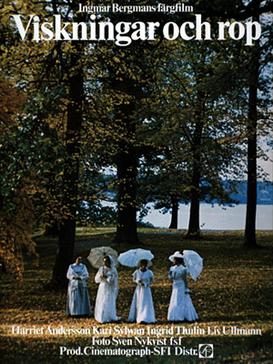
Cries and Whispers is a 1972 Swedish period drama film written and directed by Ingmar Bergman and starring Harriet Andersson, Kari Sylwan, Ingrid Thulin and Liv Ullmann. The film, set in a mansion at the end of the 19th century, is about three sisters and a servant who struggle with the terminal cancer of one of the sisters (Andersson). The servant (Sylwan) is close to her, while the other two sisters confront their emotional distance from each other.
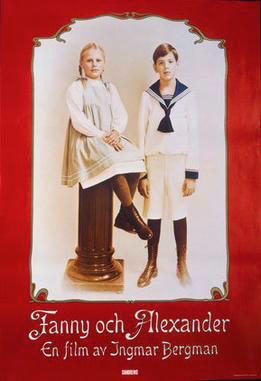
Fanny and Alexander is a 1982 period drama film written and directed by Ingmar Bergman. The plot focuses on two siblings and their large family in Uppsala, Sweden during the first decade of the twentieth century. Following the death of the children's father, their mother remarries a prominent bishop who becomes abusive towards Alexander for his vivid imagination.

Persona is a 1966 Swedish avant-garde psychological drama film written, directed, and produced by Ingmar Bergman and starring Bibi Andersson and Liv Ullmann. The story revolves around a young nurse named Alma (Andersson) and her patient, well-known stage actress Elisabet Vogler (Ullmann), who has suddenly stopped speaking. They move to a cottage, where Alma cares for Elisabet, confides in her, and begins having trouble distinguishing herself from her patient.

Scenes from a Marriage is a 1973 Swedish television miniseries written and directed by Ingmar Bergman. Over the course of six hour-long episodes, it explores the disintegration of the marriage between Marianne, a divorce lawyer, and Johan, a reader in psychology. The series spans a period of 10 years. Bergman's teleplay draws on his own experiences, including his relationship with Ullmann. It was shot on a small budget in Stockholm and Fårö in 1972.

Erland Josephson was a Swedish actor and author. He was best known by international audiences for his work in films directed by Ingmar Bergman, Andrei Tarkovsky and Theodoros Angelopoulos.

The Virgin Spring is a 1960 Swedish film directed by Ingmar Bergman. Set in medieval Sweden, it is a tale about a father's merciless response to the rape and murder of his young daughter. The story was adapted by screenwriter Ulla Isaksson from a 13th-century Swedish ballad, "Töres döttrar i Wänge". Bergman researched the legend of Per Töre with an eye to an adaptation, considering an opera before deciding on a film version. Given criticism of the historical accuracy of his 1957 film The Seventh Seal, he also invited Isaksson to write the screenplay. Other influences included the 1950 Japanese film Rashomon. Max von Sydow played Töre.

Sven Vilhem Nykvist was a Swedish cinematographer and filmmaker.
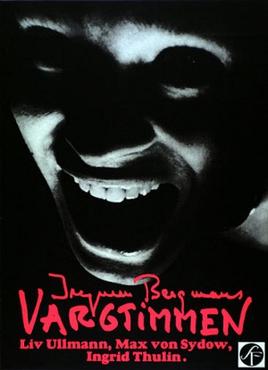
Hour of the Wolf is a 1968 Swedish psychological horror film directed by Ingmar Bergman and starring Max von Sydow and Liv Ullmann. The story explores the disappearance of fictional painter Johan Borg, who lived on an island with his wife Alma (Ullmann) while plagued with frightening visions and insomnia.

The Touch is a 1971 Swedish romantic drama film directed and written by Ingmar Bergman and starring Max von Sydow, Bibi Andersson, Elliott Gould, and Sheila Reid. The film tells the story of an affair between a married woman and an impetuous foreigner. It contains references to the Virgin Mary and the Holocaust.

Through a Glass Darkly is a 1961 Swedish drama film written and directed by Ingmar Bergman, and starring Harriet Andersson, Gunnar Björnstrand, Max von Sydow and Lars Passgård. The film tells the story of a schizophrenic young woman (Andersson) vacationing on a remote island with her husband, novelist father (Björnstrand), and frustrated younger brother (Passgård).

Winter Light is a 1963 Swedish drama film written and directed by Ingmar Bergman and starring his regulars, Gunnar Björnstrand, Ingrid Thulin and Max von Sydow. It follows Tomas Ericsson (Björnstrand), pastor of a small rural Swedish church, as he deals with an existential crisis and his Christianity.

Ansiktet, also released as The Magician, is a 1958 Swedish film written and directed by Ingmar Bergman, starring Max von Sydow and Ingrid Thulin. The plot follows a traveling magician named Albert Vogler, whose allegedly supernatural live shows are challenged by the skeptical population of a small village.
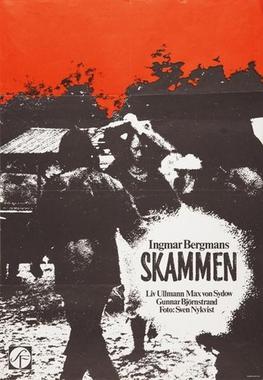
Shame is a 1968 Swedish drama film written and directed by Ingmar Bergman, and starring Liv Ullmann and Max von Sydow. Ullmann and von Sydow play Eva and Jan, former violinists, a politically uninvolved couple whose home comes under threat by civil war. They are accused by one side of sympathy for the enemy, and their marriage deteriorates while the couple flees. The story explores themes of shame, moral decline, self-loathing and violence.

The Magic Flute is Ingmar Bergman's 1975 film version of Mozart's opera Die Zauberflöte. It was intended as a television production and was first shown on Swedish television on 1 January 1975, but was followed by a theatrical release later that year. The work is widely viewed as one of the most successful films of an opera ever made, and as an unusual item among the director's works. The film won the BAFTA TV Award for Best Foreign Television Programme in 1976 and was nominated for the Golden Globe for Best Foreign Language Film and the Academy Award for Best Costume Design.
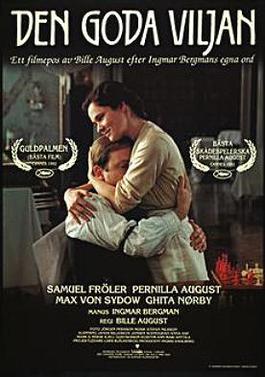
The Best Intentions is a 1991 Swedish television drama film directed by Bille August and written by Ingmar Bergman. It is semi-autobiographical, telling the story of the complex relationship between Bergman's parents, Erik Bergman and Karin Åkerblom, who are renamed Henrik and Anna in the film but retain their true surnames. The film documents the courtship and the difficult early years of their marriage, until the point when Anna becomes pregnant with their second son, who corresponds to Ingmar himself. Samuel Fröler and Pernilla August played Henrik and Anna, respectively.

Robert Atzorn is a German television actor. He was born in Bad Polzin, Pomerania, Germany, now Połczyn-Zdrój, West Pomeranian Voivodeship, Poland.

Fårö Document is a 1970 Swedish documentary film directed by Ingmar Bergman. It was shot on the island of Fårö and is about its inhabitants.
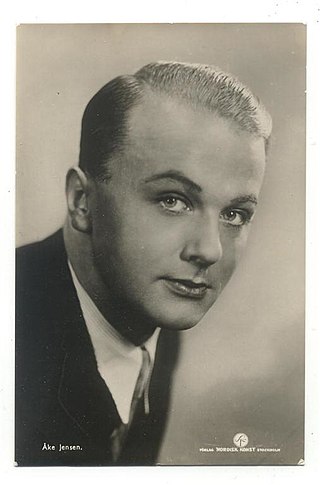
Åke Jensen (1912–1993) was a Swedish stage and film actor and singer. He appeared in a number of operettas and revues.




















